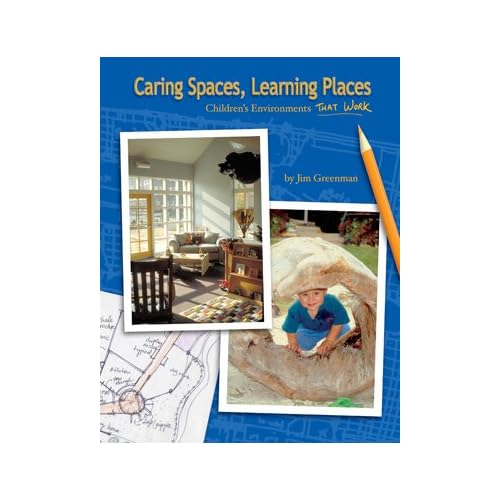
I have been reading...Caring Spaces, Learning Places: Childrenʼs Environments THAT WORK by Jim Greenman, and wholeheartedly recommend this book to teachers who are keen to continually reflect on and review the caring Space and learning Places they create and build for young children.
Over the past few years I have had many wonder-filled opportunities to visit airports, railway stations, churches, abbeys, museums, art galleries and early childhood settings. So often these have been interesting, awe inspiring and jaw droppingly beautiful. All places and spaces evoked a response in me. Sometimes I felt over-joyed, amazed or overwhelmed. Sometimes I felt like staying a long time and other times I felt like screaming “get me out of here fast”. At all times I had the power and resilience to go or stay.
All of these spaces gave cues to what is valued here and the purpose of the place. The purposes included: serving food, providing curation for precious items, displaying fantastic art, praise and worship, corralling and facilitating the movement of people, caring for and educating small children. All of these places are work spaces for people and colleagues. Some of these places are living, learning and loving spaces for our most precious and most vulnerable human beings. These travel and learning opportunities gives me cause to think about the places and spaces we provide for children in our early childhood care and education settings in New Zealand.
For ideas and reflective prompts I reached for Jim Greenmanʼs book ʻCaring Spaces, Learning Placesʼ. In the foreword to Jimʼs book, Lella Gandini says, “We have all experienced how even a small improvement in a learning space can reverberate in positive ways, but we have also learned that one cannot stop there. It is the value that we attribute to the potentials of children and our respect for their learning as individuals and as groups that can truly create a shift in our teaching, transforming us from being “only” teachers to being true listeners and learners.” (p. vii)
Experiences and time spent in our settings in New Zealand is as diverse as the children and families who use the service. Jim Greenman tells us that if fifteen-week-old Hannah continues in Childcare until elementary school, (NZ 6 year old) she will have spent around 12,000 hours at the centre, more time than she will spend in all of elementary and high school. Her brother Michael attends pre-school a few hours a day, he may spend up to 1,000 hours at the service. (p.54).
In this book Jim Greenman inspires by sharing the stories, insights and poetry of many people as he kindly challenges and supports us in reviewing and re-thinking the lives of children and teachers in our early childhood settings. He provides many good ideas and tools for changing and improving early childhood education environments in early childhood settings. The review, changes and improvements to our early childhood care and education settings can and will transform us teachers into “true listeners and learners”.
I particularly liked the discussion on institutionalized childhoods (p.64) which concludes with a list of reflective questions that would be a very useful review tool to work through as a team of teachers. I recommend this book to those teachers who are “... carrying out one of the most delicate missions in life, namely sustaining the growth and learning of children as individuals and in groups.” (Lella Gandini p.vii)
ISBN 0-942702-33-6
Kathryn Delany


